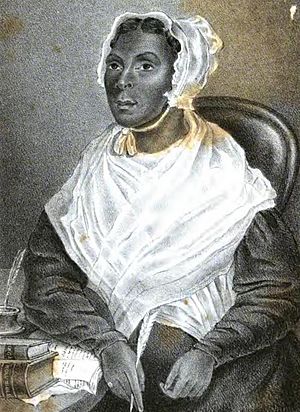Jarena Lee facts for kids
Jarena Lee (born February 11, 1783 – died February 3, 1864) was an amazing woman. She became the first woman preacher in the African Methodist Episcopal Church (AME). This church was founded by Richard Allen.
Jarena Lee was born into a free Black family in New Jersey. She felt a strong calling from God to preach. At first, Richard Allen said no to her request. But in 1819, he heard her preach and was so impressed that he changed his mind.
Lee became a leader in the Wesleyan-Holiness movement. She traveled far and wide as a preacher. She taught about "entire sanctification," which means feeling completely pure and close to God. In 1836, Jarena Lee made history again. She became the first African American woman to publish her own autobiography.
Contents
Early Life and Faith
Jarena Lee was born on February 11, 1783, in Cape May, New Jersey. We know this from her autobiography. She grew up in a free Black family.
From age 7, she worked as a live-in servant for a white family. We don't know much about her family or her early childhood. As a teenager, she moved to Philadelphia, Pennsylvania. There, she continued working in people's homes.
Lee later shared that she didn't learn much about religion as a child. But when she was older, she heard Christian teachings during special church events. She felt a deep need for faith. After much prayer, she felt a strong connection to God and was baptized. She later felt completely pure and filled with the Holy Spirit. This feeling is called sanctification.
Her Call to Preach
Soon, Jarena Lee felt God telling her, "Go preach the Gospel!" She told Richard Allen that God wanted her to preach. But Allen explained that the Methodist Church did not allow women preachers.
Jarena Lee did not give up. She famously asked, "If a man can preach because Jesus died for him, why not a woman? Didn't Jesus die for her too?" Allen still said no.
However, eight years later, something amazing happened. During a Sunday service, the preacher seemed to lose his energy. Jarena Lee stepped forward and began to preach. The crowd was very interested in what she had to say.
Her strong belief in God gave her great confidence. When people questioned women preaching, she would ask, "Didn't Mary first tell everyone that Jesus had risen?" The idea that African Americans and women could preach became more popular during a time called the Second Great Awakening. This was a period when many people became very religious.
Jarena Lee wrote about her religious experiences. Publishing her autobiography made her the first African American woman to have her life story printed in the United States. Even with Richard Allen's support, Jarena Lee still faced challenges. Some people didn't like her preaching because she was Black and a woman.
She became a traveling minister, walking thousands of miles. In just one year, she traveled over 2,300 miles and preached 178 sermons!
A Story of Faith
In her book, The Religious Experience and Journal of Mrs. Jarena Lee, she tells a story about a young man. He often made fun of her preaching because he didn't believe in God. This young man, who was also a person of color, regularly came to her meetings.
Later, he became very ill. His sister, who was a church member, asked Jarena Lee to visit him. She hoped that God would touch his heart. When Lee visited, the young man was very weak. She asked if he wanted her to pray for him, and he said yes. Even though he didn't get better, he kept asking her to pray for him by his bedside.
Marriage and Ministry
Jarena Lee moved to Philadelphia as a teenager. Her life changed when she heard a powerful sermon by Richard Allen. In 1811, she married Joseph Lee. This was seven years after she joined Mother Bethel Church in Philadelphia.
Joseph Lee was a pastor at a church in Snow Hill, about six miles from Philadelphia. Jarena moved to Snow Hill with him. She felt a bit unsure because she didn't know anyone there except her husband. She missed the close community she had in Philadelphia.
During their marriage, her husband did not want her to preach. This made her feel like she had to put her spiritual calling on hold. It is said that not being able to fully follow her spiritual path made her feel unwell and unhappy. Joseph Lee died six years after they were married. After his death, Jarena Lee fully dedicated herself to her religious work.
Her Lasting Impact
Jarena Lee is remembered as the first woman to preach in the African Methodist Episcopal (AME) Church. Her life story shows how important personal holiness and sanctification were in American religious movements of the 1800s.
She is often compared to other important African American women of her time, like Maria W. Stewart and Sojourner Truth. After Jarena Lee became a preacher, other women like Juliann Jane Tillman also became well-known evangelists in the AME Church.
Most of what we know about Jarena Lee comes from her autobiography. It was first called The Life and Religious Experience of Jarena Lee. Later, an expanded version was published as Religious Experience and Journal of Mrs. Jarena Lee. Research by Dr. Frederick Knight shows that Jarena Lee died in Philadelphia in early 1864. She had no money at the time of her death.
Jarena Lee is still studied today. There is a research project about her at Harvard Divinity School called "The Resurrection of Jarena Lee." Womanist Biblical scholar Nyasha Junior is part of this project.
Images for kids
See also
- Richard Allen
- "Black Harry" Hosier
- Juliann Jane Tillman
- Mary G. Evans
- Martha Jayne Keys
- Amanda Smith



